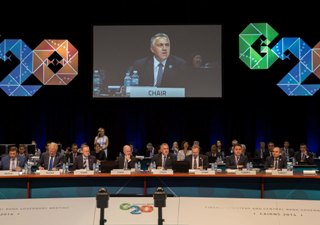 The Group of 20’s (G20) finance ministers and central bank governors have agreed to develop new measures to strengthen global commerce as they voiced concern over the growing threat of an economic slowdown.
The Group of 20’s (G20) finance ministers and central bank governors have agreed to develop new measures to strengthen global commerce as they voiced concern over the growing threat of an economic slowdown.
The finance ministers wrapped up their two-day summit in Cairns, Australia, with a promise to focus on economic growth, infrastructure development, improving the safety of the global financial system, and a coordinated effort against large multinationals avoiding tax.
“We welcome the stronger economic conditions in some key economies, although growth in the global economy is uneven and remains below the pace required to adequately generate much needed jobs,” the group said in a communiqué released at the conclusion of their meeting on September 20-21.
“Downside risks persist, including in financial markets and from geopolitical tensions. The global economy still faces persistent weaknesses in demand, and supply side constraints hamper growth. We need strong, sustainable and balanced growth and robust financial sectors to safeguard our economies from these risks and put people into jobs,” it added.
The G20 economies said they plan to “develop new measures that aim to lift our collective GDP by more than 2 percent by 2018” above the target set in 2013 through private-sector investment and employment.
These will include a set of new concrete measures toward structural reforms “that will facilitate growth, increase and foster better quality investment, lift employment and participation, enhance trade and promote competition.”
The declaration added that based on indicators from the International Monetary Fund-Organisation for Economic Co-operation and Development (OECD), these measures will lift the group’s collective GDP by an additional 1.8 percent through to 2018.
Moreover, the official pledged to “continue to identify a series of additional measures to meet our collective growth ambition.”
All these measures are “designed to lift global growth and contribute to rebalancing global demand, as well as “foster private sector growth, to give our citizens more opportunities to improve their living standards.”
Global infrastructure initiative
The leaders also agreed to support a “global infrastructure initiative” to increase quality investment in infrastructure. The initiative will seek to develop a knowledge-sharing platform to address data gaps on infrastructure development to help match potential investors with projects. The initiative will also include key measures to improve investment climates to attract private sector participation.
The implementation mechanism for the initiative will be announced in November, the declaration said.
The OECD recently revised downward its economic outlook for the United States, the Euro zone, and Japan for this year and 2015. This came following the identification of a deflation risk in Europe, the impact of import bans and sanctions over the Ukraine crisis, and the effect on emerging economies of the tapering of massive U.S. monetary stimulus.
Japan is also under pressure from the consumption tax hike in April that has weakened private consumption. The yen’s recent decline to a six-year low against the U.S. dollar could also hamper Japan’s growth.
Member-economies of the G20 are Argentina, Australia, Brazil, Britain, Canada, China, France, Germany, India, Indonesia, Italy, Japan, Mexico, Russia, Saudi Arabia, South Africa, South Korea, Turkey, the United States, and the European Union.
The next big G20 event is the leaders’ summit in Brisbane on November 15 and 16.
Photo: Commonwealth of Australia




